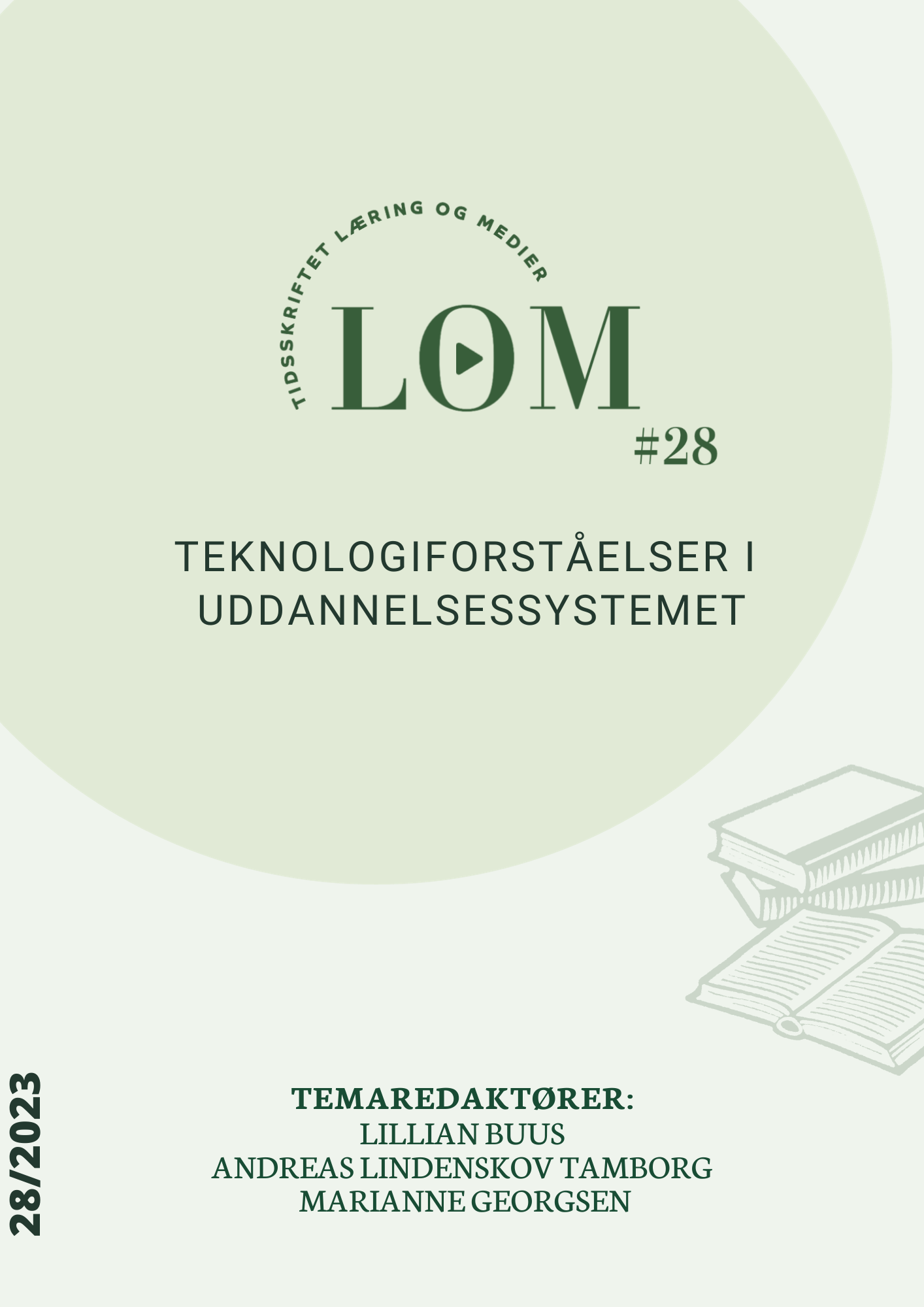Når studerende tør, gør og tænker professionelt med digitale teknologier
Empirisk studie af professionsstuderendes måde at skabe med digital teknologi på studiet og i praktikken
DOI:
https://doi.org/10.7146/lom.v16i28.136353Keywords:
digitalt mod, teknologiforståelse, leg, digital foretagsomhed, digital forestillingskraftAbstract
In this article, we present our study of University College students' digital entrepreneurship in relation to acting on challenges and opportunities in their professional practice using digital technology.
We introduce a best-practice study where we have used Research through Design (Nelson & Stolterman, 2012, Hjorth, 2019) to conduct a reflexive thematic analysis that identifies strong concepts (Höök & Löwgren, 2012) in the empirical material. These strong concepts show us important markers in the learning process of the students who have developed their practice with digital technology.
Part of our empirical foundation is conveyed as small, animated videos, where the main characters represent three students of different professions. The students have all experienced disharmonies (Spinoza, 1999) in their internship period, which they have solved using digital technology. The multimodal stories are thus a way to show the way to the strong concepts that we have arrived at in our study.
The analysis reveals four strong concepts that characterize students' learning process towards becoming digitally competent in their profession: 1) user experience, 2) Play 3) digital courage, 4) digital imagination and 5) nexus.
Downloads
References
Ananiadou, K., & Claro, M. (2009). 21st Century Skills and Competences for New Millennium Learners in OECD
Countries. OECD Education Working Papers, No. 41. OECD Publishing (NJ1).
Bandura, A. (1997). Self-Efficacy. The exercise of Control. New York. W.H Freeman and Company.
Beierholm, M.H., Hjorth, M., Basballe D.A (2022). Teknologiforståelse som dannelsesaspekt i Lærerens Grundfaglighed: Et møde mellem digitale teknologier og dannelsesteori i undervisningen. Studier i læreruddannelse og-profession 7 (1), 10-29. https://doi.org/10.7146/lup.v7i1.132431
Braun, V., & Clarke, V. (2008). Using Thematic Analysis in Psychology. Qualitative Research in Psychology , 3 (2), s. 77-101. http://dx.doi.org/10.1191/1478088706qp063oa
Caspersen, M.E., Gal-Ezer, J., McGettrick, A. and Nardelli, E. (2022). Informatics for all: The strategy. Informatics for all. Lokaliseret d. 4.9.2023 ttps://www.informaticsforall.org/informatics-for-all-the-strategy/
Dalsgaard, C., Caviglia, F., Boie, M. A. K., Færgemann, H. M. og Thomsen, M. B. (2020). Digitale kompetencer i fagene - Pædagogiske formater til at arbejde med digitale kompetencer i gymnasiet. Center for Undervisningsudvikling og Digitale Medier, Aarhus Universitet.
Digital Dogme (2022). Det Digitale Kompetencebarometer. Digital Dogme og HBS Economic. https://media.graphassets.com/Gl81UKFCTcGfG8bhbXZ2
Fragtrup, D. & Burlin, C. (2015). Teknologiforståelse blandt lærer-og sygeplejerskestuderende. Opsamling af kvantitative resultater. Tåstrup: Teknologisk Institut. https://technucation.dk/fileadmin/_migrated/content_uploads/Teknologiforstaaelse_blandt_sygepleje-_og_laererstuderende.pdf
Gartner, W.B. (1993). Words lead to deeds: Towards an organizational emergence vocabulary. Journal of Business Venturing, vol. 8, s. 231-239.
Giertz, 2019. Why you should make useless things. TedTalk. https://www.youtube.com/watch?v=c0bsKc4tiuY&ab_channel=TED
Hjorth, M. (2019). The K-12 Maker Studio: Towards Teaching and Development of Design Literacy in Educational Maker Settings. Ph.D.-afhandling. Aarhus University. https://doi.org/10.7146/aul.355
Höök, K. & Löwgren, J. (2012). Strong concepts: Intermediate-level knowledge in interaction design research. ACM Transactions on Computer –Human Interaction, 19(3). https://doi.org/10.1145/2362364.2362371
Illeris, K. (2015). Læring. Samfundslitteratur.
Illeris, K. (2013). Transformativ læring og identitet. Roskilde, Samfundslitteratur.
Iversen, O.S., Dindler, C., & Smith, R.C. (2019). En designtilgang til teknologiforståelse. Dafolo.
Kirketerp, A. L. (2010). Pædagogik og didaktik i entreprenørskabsundervisningen på de videregående uddannelser i et foretagsomhedsperspektiv. Ph.d.-afhandling. Syddansk Universitets forlag.
Kirketerp, A. L. (2012). Foretagsomhedspædagogik og skubmetoden. Foretagsomhedens didaktik. Kognition og Pædagogik, nr. 83 marts 2012, s. 66-86.
Klafki, W. (1959/1964). Das pädagogische Problem des Elementaren und die Theorie der kategorialen Bildung. Weinheim. Julius Beltz.
Klafki, W. (2001). Dannelsesteori og didaktik – Nye Studier. Klim.
Lakoff G. & Johnson M. (1980). Metaphors We Live By. Chicago: University of Chicago Press.
Lassen, A. M. & Kjærgaard, T. (2022). Teknologiforståelser i professionerne. Learning Tech. Tidsskrift for læremidler, didaktik og teknologi, (1), s. 15-43. https://tidsskrift.dk/learningtech/article/view/128421/178856?fbclid=IwAR3-c_PJS8juEIk6eoGVvJwIatgy_FNUA1irvUdTCCDT845B2N3oCF4YyZs
Nelson, H.G., & Stolterman, E. (2012). The design way: Intentional change in an unpredictable world. MIT Press.
Pahus, J., Høybye-Mortensen, M., Binderup, A. T., Buus, L. og Hjort, M. (2023). Professionsrettet teknologiforståelse - et diskussionsoplæg til ledere af fagprofessionelle. Lederliv, vol. 3. https://lederliv.dk/artikel/professionsrettet-teknologiforst%C3%A5else
Skovbjerg, H. M. (2018). Nu skal I ikke højere op: I Møller, H. H., Andersen, I. H., Kristensen, K. B. & Rasmussen C. S (red.), Leg i skolen. 1. udg., s. 10-30. Forlaget UP – Unge pædagoger.
Voogt, J., & Roblin, N.P. (2012). A comparative analysis of international frameworks for 21st century competencies: Implications for national curriculum policies. Journal of curriculum studies, 44(3), s. 299-321. https://doi.org/10.1080/00220272.2012.668938
Wing, J. M. (2006). Computtaional thinking. Communications of the ACM, 49(3), s. 33 – 35.
Wiskerchen, M., Andersen, L. B., Emtoft, L. M., Jespersen, P., Kornholt, B., Madsen, P. H., Møller, L. D., Nielsen, L., & Schou, D. V. (2023). Udviklingslaboratorier som metode til kompetenceudvikling i teknologiforståelse: Erfaringer med TEKFAG-modellen. Tidsskriftet Læring Og Medier (LOM), 15(27). https://tidsskrift.dk/lom/article/view/134106/181716
Downloads
Published
How to Cite
Issue
Section
License
Copyright (c) 2023 Maria Høegh Beierholm, Mette Engberg-Sønderskov

This work is licensed under a Creative Commons Attribution-NonCommercial-NoDerivatives 4.0 International License.

Articles published in the Journal of Learning and Media are licensed under a Creative Commons Attribution-NonCommercial-NoDerivatives 3.0 Unported Licens.
Authors retain copyright and grant the journal right of first publication; simultaneously articles are licensend under the Creative Commons Attribution license: Attribution-NonCommercial-NoDerviatives (by-nc-nd). Read about this license at https://creativecommons.org/licenses/by-nc-nd/3.0/
---
At LOM.dk, you will also find articles from the discontinued Journal for the Continuing and Further Education of the Danish Universities (UNEV). Note that special rules apply to UNEV articles:
It is the authors and any other copyright holder who have the copyright of articles published under the auspices of UNEV, and access to the articles is contingent on users acknowledging and complying with the associated legal guidelines:
- Users may download and print one copy of any UNEV publication for private studies or research.
- The redistribution of articles or the use of these for revenue-funded activities or commercial purposes are not allowed.
- It is not allowed to distribute the URLs of UNEV articles.


